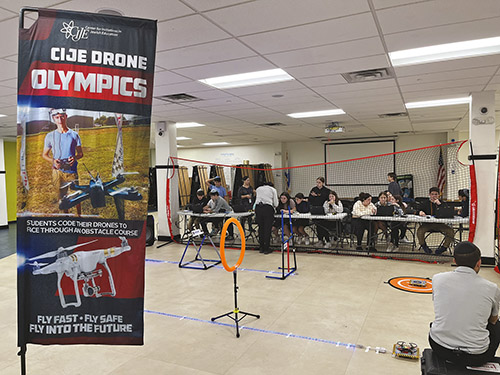
Over the course of three days, the Center for Initiatives in Jewish Education (CIJE) traveled around Bergen County carrying everything necessary to host its Drone Olympics program. The staff uses cargo netting, obstacles made of PVC pipe and other plastic tubing, a dozen laptops, and a dozen small autonomous drones to make everything happen.
What’s the difference between an autonomous drone and other types of drones? That’s one of the things that the middle schoolers at the Moriah School, Solomon Schechter Day School of Bergen County, Tenafly Chabad Academy, Yavneh Academy, Yeshivat He’Atid, and Yeshivat Noam learned from a CIJE presentation before they tried flying them.
Created in 2001, CIJE coordinates educational programs in more than 175 Jewish schools across the country. Those programs impact the learning of more than 45,000 students each year and focus on both the ever relevant (collaborating in teams, developing critical thinking skills and finding solutions) and the futuristic (the STEAM component). According to the organization, the goal is to prepare the next generation for innovation by funding programs with advanced technology, developing engaging curricula, and providing ongoing teacher training, mentorship and school visits by engineers.

The Drone Olympics program has already traveled to over 50 middle schools across the country. Students learn about different types of drones, how they work, and how to use laptops to fly them. They then measure an obstacle course that features bars for the drones to fly over and under, hoops for the drones to fly through, and finally a landing pad for the drone at the end.
“The Drone Olympics is a prime example of the experiential nature of learning that CIJE brings to life,” said Orly Nadler, CIJE director of innovation. “Aerodynamics is both taught and experienced as students are challenged with navigating a drone through an intricate obstacle course. Students must use many skills to achieve the challenge: measurement, estimation, coding, thoughtful iteration and teamwork.”
How are the students able to do all of this so quickly? Well, for most, this isn’t their first experience with programming.
Most of the students have experience using Scratch, a programming language that was invented in order to make it easier for kids to learn programming with basic English words instead of complicated terms. The laptops that CIJE brings have DroneBlocks software that uses Scratch to make it easy for the kids to fly the drones.

The highlight of the CIJE tour of Bergen County was a team of seventh graders from Yeshivat He’Atid. A trio of girls who named themselves the “Lemon Lime Lollipops” (due in part to their piloting of the lime green drone) were able to land their drone on the landing pad at the end of the course. This is not a fairly pedestrian outcome—it was just the second time in the program’s history that a team had successfully landed its drone on the pad.
Between there being a minimum of 10 commands (though most teams use 12); each command requiring a measurement; the slightest gust of wind from the school’s ventilation system blowing the drone off course; and the fact that the pad is barely larger than the drone itself…Let’s just say Regan Wolf, Gal Mermelstein and Miya Sandler accomplished something of which they can be very proud.
“It was a fun experience to work as a team and a great opportunity to gain experience with drones and coding,” said Mermelstein on behalf of her teammates, all three of whom are from Teaneck.
As children become more and more interested in these programs at younger and younger ages, the schools are looking to organizations like CIJE to help them provide an outlet for the endless resource that is youthful curiosity.
“At Yeshivat He’Atid, we’re really passionate about STEM,” said Leiku Perles, Yeshivat He’Atid’s director of general studies curriculum for grades 1-8. “Between our robotics classes, science enrichment labs, and middle school robotics team, we’re always looking for ways to provide our students with enriching STEM experiences beyond the classroom. CIJE has played a large role in these opportunities, and the Drone Olympics were a huge success.”
Nati Burnside is a freelance writer living in Fair Lawn and is a man of many interests. He can be reached at [email protected].













